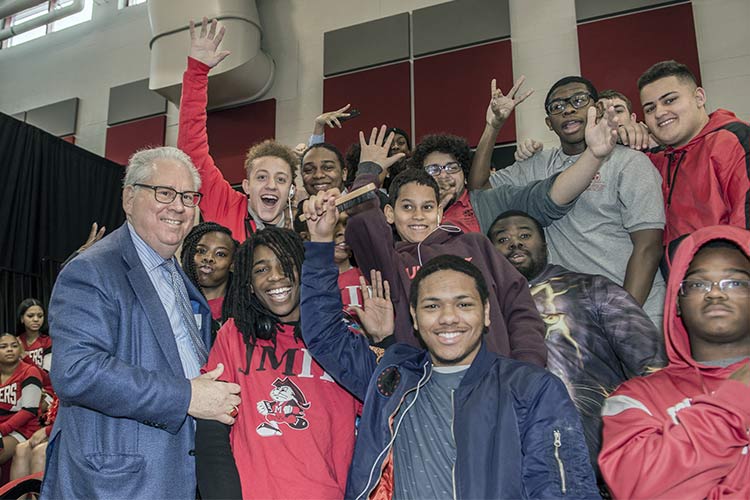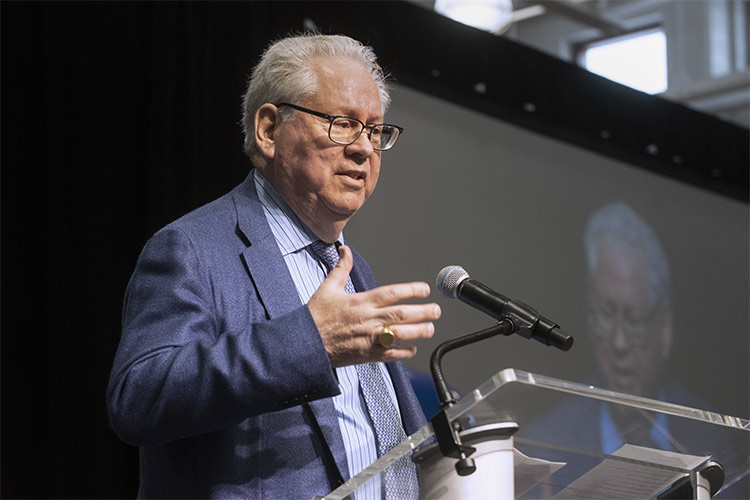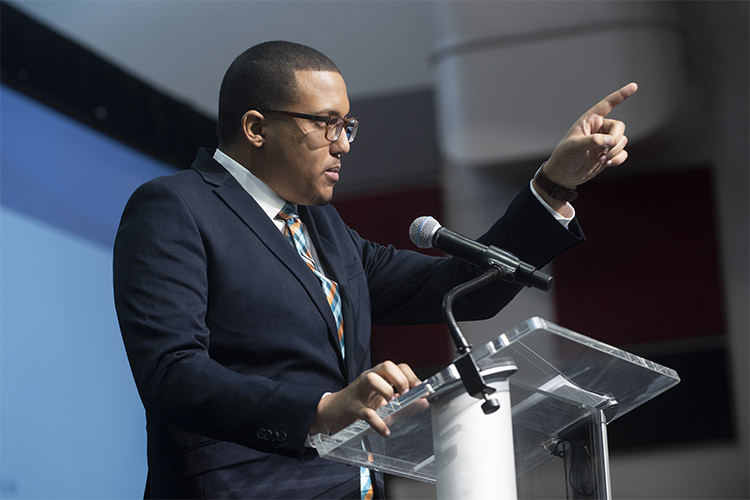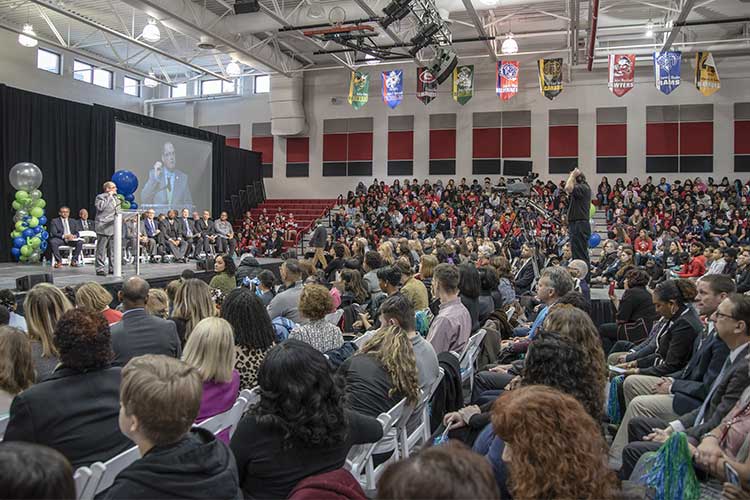Why Say Yes to Education is a game-changer for not just CMSD students, but all of Cleveland
With 20 cities in the running, Cleveland’s chances of becoming the next Say Yes To Education chapter—and only the fourth in the country to receive the distinction—were just a paltry five percent. Yet according to Say Yes founder George Weiss, it was no contest.
“Cleveland just kicked butt,” Weiss declared before officially designating Cleveland as the next Say Yes city last Friday, January 18. “Cleveland was the only city to be presented to the board. So, I’ve got a question for you: ‘Cleveland, are you ready?’”
 George Weiss who founder of Say Yes to Education
George Weiss who founder of Say Yes to Education
And, with that, Weiss announced to a packed crowd of students and community leaders that the nearly 39,000 students in Cleveland Municipal School District—Ohio's second largest school district—can now go on to two-year and four-year colleges and universities tuition-free, starting with the 2019 graduating class and continuing for 25 years.
“We stand with 117 private colleges who are going to offer every student in the public school system of Cleveland, Ohio, free college tuition,” said Weiss, who founded Say Yes to Education 32 years ago in Philadelphia.
The fine print states that any student who lives in Cleveland and is enrolled in a CMSD high school or affiliated charter school (including those living in Bratenahl, Linndale, Newburgh Heights, and parts of Brook Park and Garfield Heights) will be eligible to receive a full tuition scholarship, after any state or federal aid. The tuition can be applied to any state secondary institution or 117 private schools in a national compact.
The only requirements are that students must attend all four years of high school at a CMSD school with family income below $75,000 annually. Students in households earning more than $75,000 are eligible for up to $5,000 in scholarship funds. All students will still have to cover living expenses.
The monumental announcement has been in the works since May 2017, when Cleveland entered the pre-launch phase of Say Yes to Education. The city fulfilled several requirements, including raising $88.4 million to meet the requirement of raising at least 60 percent of a $125 million goal to fund the tuitions. The money was raised by both private and public donations by Cleveland individuals, residents, business, and organizations.
As a Cleveland State University junior, future educator, and Say Yes committee member, Matthew Moody was on the frontlines for the planning process. He believes Cleveland was the clear candidate to be the next Say Yes city—joining the fold with Buffalo, Syracuse, and Guilford County in North Carolina.
Moody cites Say Yes' COO Gene Chasin's words during Friday's event: “Collaborative work across the city, county, and philanthropic and business sectors doesn't happen in most places in our country. In fact, it's incredibly rare. Because all of these sectors—and all of our community members—believe in Cleveland's students and want to do anything to work together, that’s the reason I feel as though Cleveland was the obvious choice.”
For his part, CMSD superintendent and CEO Eric Gordon is thrilled that Say Yes to Education will greatly enhance the efforts already underway through The Cleveland Plan.
“Though we have a long way to go, CMSD has made strong progress under The Cleveland Plan, including significant improvement in our graduation rate and students' college readiness,” says Gordon. “But those gains won't matter much if students cannot access college or other post-secondary training, earn a wage that lifts them out of poverty, and help the region's workforce remain competitive in the modern economy. Say Yes will provide scholarships and support services that make those outcomes possible.”
Good for students, good for the city
With college attendance rates decreasing in recent years among CMSD students, the Say Yes to Education announcement comes at an opportune time. Case in point: 45 percent of CMSD 2016 graduates went on to college within one year of graduating, down 16 percentage points from the 2011 graduating class. “We don't know all the reasons why, but strong anecdotal evidence indicates that the rising cost of higher education plays a significant role,” says Gordon.
 Say Yes Cleveland Announcement
Say Yes Cleveland Announcement
The free tuition initiative is poised to not only benefit individuals, but the city as a whole—thanks to a better-educated rising generation and stronger incoming workforce.
“I feel as though with the concentrated childhood poverty levels that we have in Cleveland—second highest in the nation only behind Detroit—it's a positive for our students to be highly educated,” says Moody, who graduated in 2016 from Cleveland Early College High School and is now a CSU junior studying secondary math education. “It helps build a pathway out of poverty and pushes us to develop and sustain a post-secondary-going culture.”
The need for an educated workforce is a priority, agrees Lee Friedman, CEO of College Now, which will help administer the scholarship program and provide advising and mentoring services to students. College Now was also one of six organizations that worked to bring Say Yes to Education to Cleveland.
“In the region, there are 70,000 [people] unemployed and 40,000 unfilled jobs,” Friedman says. “There are thousands of jobs open every single day, but you’ve got a workforce far below academic preparedness for the region.”
Gordon says he sees the same demand from his perspective. “Many employers tell us they have jobs but lack qualified applicants,” he adds. “Say Yes can help us provide employers with a stable and adequate workforce, one that is better prepared for the challenges of the modern economy.”
The initiative may also boost Cleveland’s recent efforts around attracting and retaining talent. Gordon believes Say Yes has potential to attract new residents who want to take advantage of the scholarships, while Moody feels Say Yes can not only be a great launch pad for sending Cleveland students off to college, but returning them home to fill the need for educated workers.
“Cleveland is a boomerang city,” he says. “Students who leave here come back; if they don’t come back now, they do eventually. Students will be able to return to our community highly skilled and meaningfully contribute.”
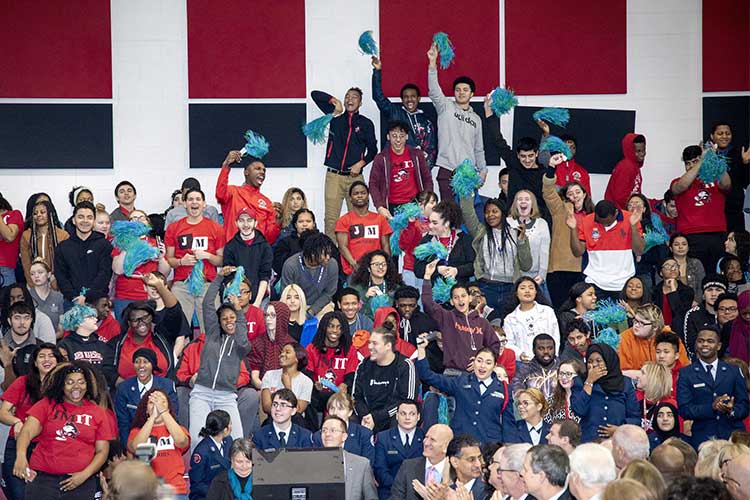 Say Yes Cleveland Announcement
Say Yes Cleveland Announcement
Wrapping around the cause
As College Now's Friedman sees it, effective support needs to go beyond just a financial commitment for covering college tuition. To that end, part of the Say Yes program will entail a variety of wrap-around programs in addition to the scholarships—with resources such as healthcare, legal assistance, and social/mental health services to keep the entire family on track.
Counseling services will also be provided for students from a young age—first to make sure students are kindergarten ready; then to make sure they've reached certain milestones by third grade; and eventually ACT and SAT prep. “It’s a chain reaction along the way,” says Friedman.
All scholarship recipients will also be required to participate in a mentoring program, administered by College Now. While College Now typically recruits about 400 mentors a year, Friedman says they will now need about 900 mentors, whom they are actively seeking now. The only requirement is that mentors must have a college degree themselves.
“[Via these additional services], students and families can overcome barriers to success,” says CMSD's Gordon. “That adds up to a healthier and more prosperous Cleveland.”
Moody says he’s seen the efforts to both improve CMSD schools and make Cleveland a great place to live and work since the announcement of the Cleveland Plan back in 2012.
“When you address education on a city-wide level, it becomes a collaborative effort to make this city as great as we can be,” he explains. “Say Yes helps us look at thinks through a different lens [and] take inventory of what progress we have made.”
And say yes to all that is to come.
Watch the Say Yes to Education announcement:

